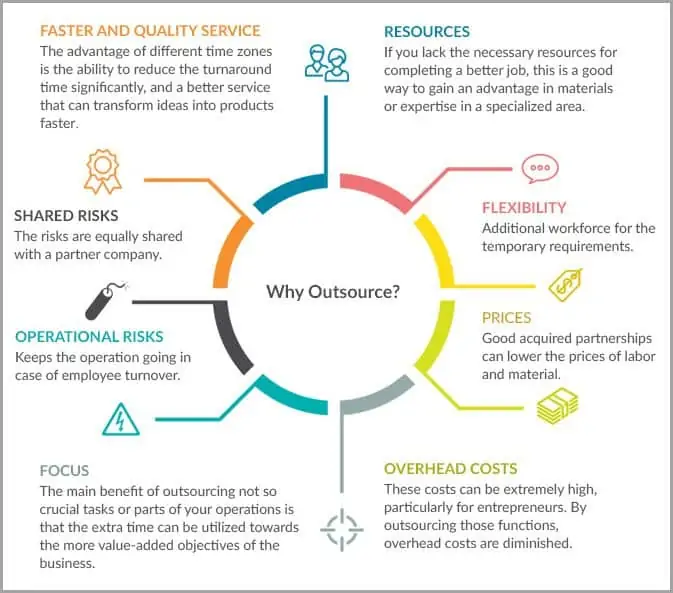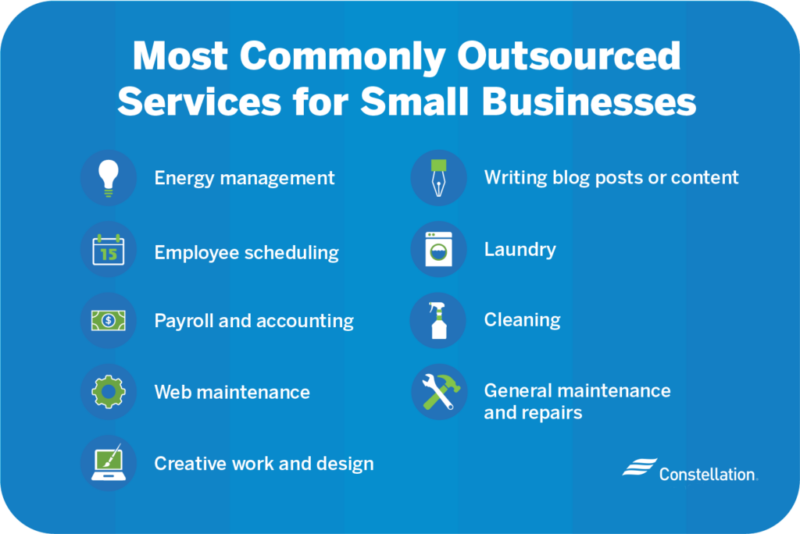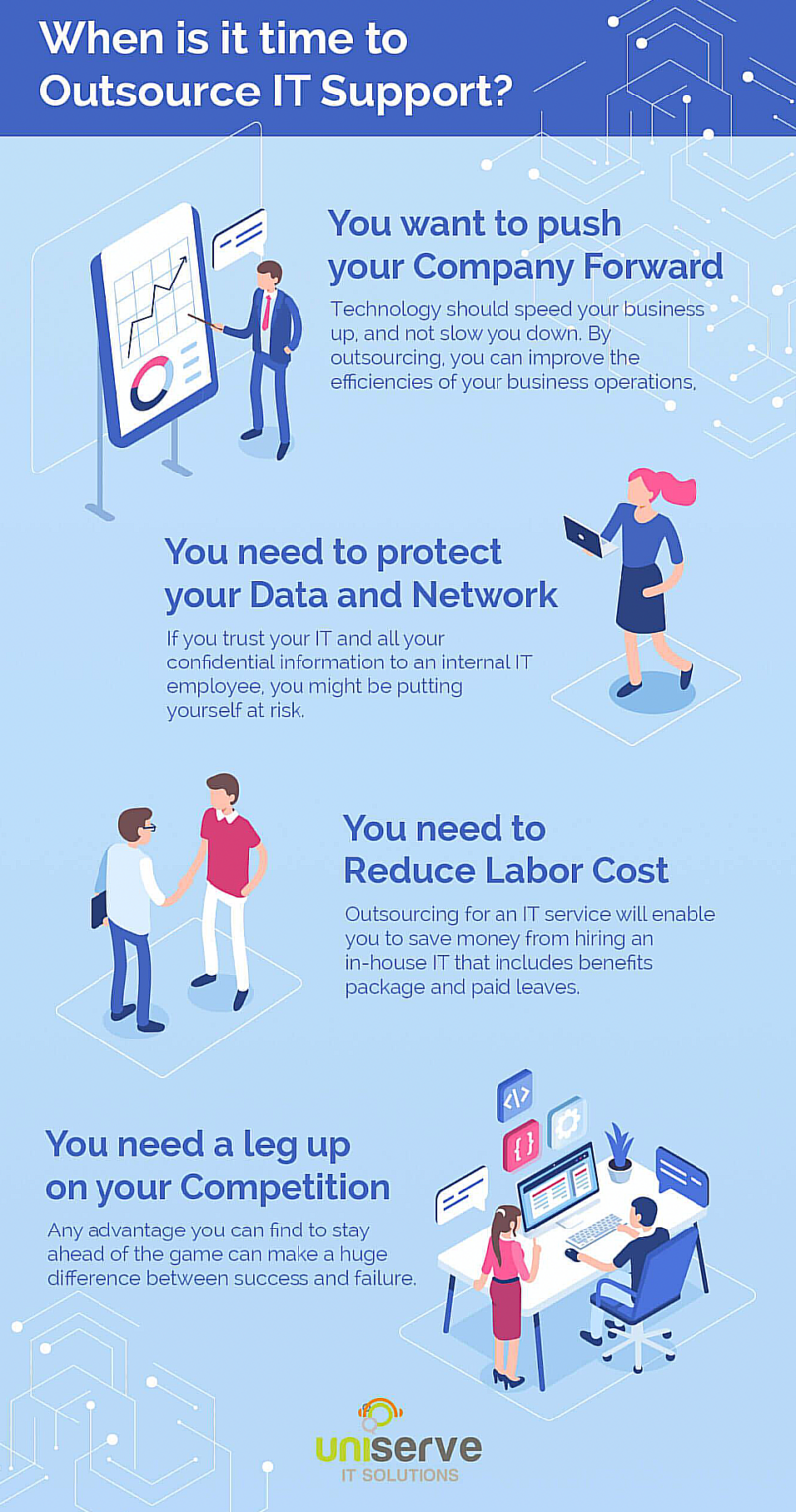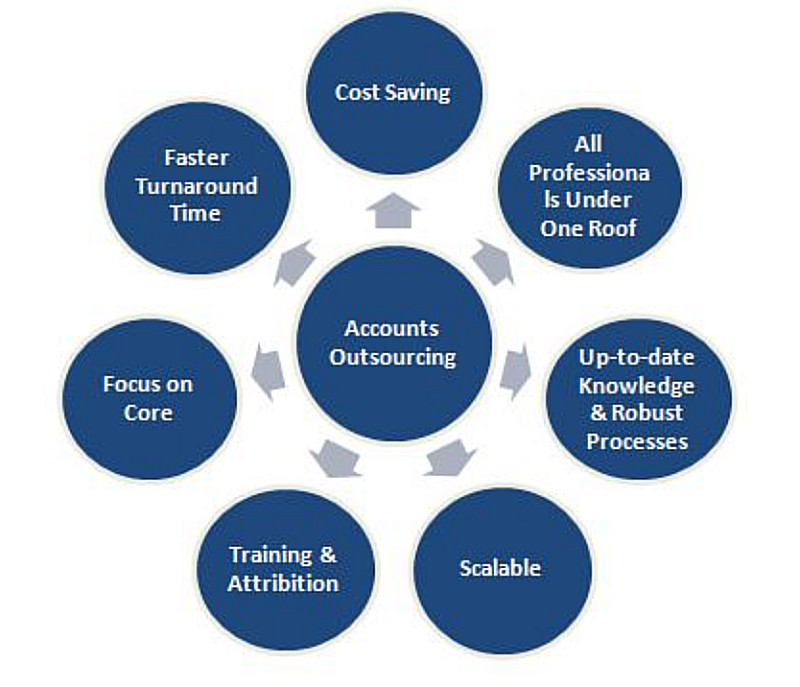As a small business owner, outsourcing presents an ideal way to reduce costs and increase productivity while being able to access expert services. It has enabled many small businesses to stay competitive by allowing them more time for their core competencies. In this post, we will focus on the advantages of outsourcing companies, ways to select providers, commonly outsourced products/services, and how to tackle possible problems that may arise during the process. With all this info, you can be equipped enough when it comes down to picking out what best suits your business.
Key Takeaways
- Outsourcing offers small businesses cost reduction, improved productivity and access to specialized expertise.
- Small businesses must carefully consider the skills, communication capabilities and security commitments of potential outsourcing providers before selecting one.
- Commonly outsourced services for small businesses include IT support & services, accounting & bookkeeping and marketing & social media management. Challenges such as maintaining control/quality can be overcome with clear expectations/measurement of performance.
The Advantages of Outsourcing for Small Businesses

For small businesses, outsourcing presents a great opportunity to upgrade operations and stay competitive in the market. By partnering with an outsourcing company, it is possible for them to reduce costs while improving their productivity at the same time. These firms are given access to an extensive pool of specialized knowledge that allows business owners more freedom within core functions thus maximizing business efficiency.
To truly take advantage of all this potential provided by outsourcing solutions one must understand its three main elements – cost reduction capabilities, improved work performance, and access expertise possibilities – each providing valuable leverage when employed correctly. This comprehension gives entrepreneurs clarity on how best they can integrate such services into their organization’s modus operandi so as reap maximum benefits from doing so.”
Cost Reduction
Small businesses increasingly turn to outsourcing as it offers considerable cost savings. This practice involves delegating nonessential duties like data entry and bookkeeping, eliminating the necessity for benefits packages, or hiring office space to reduce fixed costs that they would otherwise consume. By doing this, expenditures become variable rather than static. A move that allows firms to allocate their resources better profitably and allows you to focus on your core business.
Outsourcing could lead small enterprises to take advantage of up to 20%–30% savings compared with other solutions commonly adopted internally. As an additional bonus, external providers may also cut labor expenses up until 90%. Delegating work through third parties helps save time while opening doors towards accessing wider pools of qualified personnel available on short notice if necessary.
In summary: Outsourcing promotes managing capital costs more efficiently along with reducing overhead due its potentiality to convert regular payments into variables ones, empowering companies via streamlined tasks performance-able at much lower rates respectively assuring great saving opportunities against traditional procedures alike
Enhanced Productivity
Small business owners often benefit from outsourcing non-core tasks in order to focus on core functions and strategic objectives. It can be highly advantageous for small businesses as they don’t need major capital investments when dealing with such service providers who take full responsibility for their work output.
Access to Expertise
For small businesses, outsourcing is not only a way to cut costs, it allows them to leverage specialists with specialized skills. By working with these experts in fields such as photography, graphic design and digital marketing for example, companies gain access to knowledgeable professionals who help keep their business agile within an ever-evolving marketplace. Human resources tasks can also be outsourced which allows small businesses save time when hiring new personnel or dealing out job responsibilities quickly and efficiently.
Selecting the Right Outsourcing Provider

Small businesses must be cognizant of three core aspects when selecting an outsourcing provider: skills and experience, communication/collaboration capacities, and commitment to security. It is critical for small enterprises to take into account these factors in order to guarantee a successful outcome from their outsourcing endeavors. In the following paragraphs we will provide helpful advice and knowledge so that small businesses are able make wise decisions while choosing a vendor.
Assessing Skills and Experience
For small businesses, evaluating the qualifications of potential outsourcing providers in connection with their particular requirements is essential. This includes assessing their industry knowledge and know-how in relation to that type of work. To decide if they have what it takes, companies can take a few steps: asking for referrals from clients, conducting interviews, checking out portfolios. Evaluating processes around quality control measures, customer service availability, and customization options when delivering services or expertise needed..
Communication and Collaboration
Effective communication and collaboration are key to successful outsourced relationships for small businesses. When choosing outsourcing firms, it is important to look for those that make themselves accessible, be truthful about what they can achieve as well as their limitations, plus partner with the customer for outcomes of the project to come out successfully. Maintaining an open dialog will create trust between both parties on matters such as timeline expectations & quality desired from each task which then contributes to timely completion rates. As small companies prioritize these factors when dealing with outside providers, this should result in mutual satisfaction overall throughout all stages of the business venture.
Security and Confidentiality
It is imperative for small businesses to ensure their data security and confidentiality when selecting an outsourcing provider in the modern digital arena. To construct trust, these companies should examine if the supplier has implemented encryption and secure data storage measures and be aware of policies relating to confidential information held about them. Having a written agreement regarding protecting sensitive business details Reinforces faith between both parties which will guarantee privacy protection.
Commonly Outsourced Services for Small Businesses

Small businesses often choose to outsource specialized skills rather than employ in-house staff. Three of the most typical outsourced services used by small companies are IT support and development, accounting/bookkeeping duties, marketing and social media management.
By leveraging these external services, small business owners can concentrate on their core capabilities while allowing experts to handle functions that do not fall within its current personnel scope. Thus helping them grow with greater efficiency. Below is a closer look into each commonly outsourced service for smaller entities:
IT Support and Services
Small businesses are increasingly taking advantage of outsourcing services to stay competitive and secure in today’s digital world. Services such as software development, network management, cybersecurity and data analytics can be outsourced which provide access to cutting-edge technology and expert support while scaling solutions accordingly.

Large corporations have long utilized IT support through outsourcing to streamline operations more efficiently. Small companies also benefit from the same approach by reducing overhead costs without sacrificing quality output. Small firms routinely outsource for these types of advantages regularly using this strategy effectively enough that it has become a standard practice among them
Accounting and Bookkeeping

Small businesses can greatly benefit from outsourcing their accounting and bookkeeping tasks, as this will give them the time to focus on making strategic decisions while still ensuring accurate financial records are kept in line with regulations. Tasks such as payroll processing, tax preparation and producing financial reports can be entrusted externally without sacrificing quality or control of the information. By selecting a reliable provider who has all of the required qualifications for these kinds of services they can confidently receive timely data that is free from risk.
Marketing and Social Media Management
Small businesses can expand their reach and stay ahead of the curve by utilizing professional services for marketing and social media management. These specialists have expertise in areas such as SEO, PPC advertising, content creation, email campaigns, website development market research & lead generation, allowing small companies to focus on what they do best while still driving business growth through strategic initiatives like social media marketing. Outsourcing these specialized skills allows smaller operations access that larger competitors may not be able to achieve with limited resources. Enabling them to remain competitive within a dynamic marketplace.
Overcoming Challenges in Outsourcing
For small business owners, outsourcing can be incredibly advantageous. It is important to understand and address the potential issues that may arise during this process. Managing control levels and quality standards, addressing any cultural discrepancies or language barriers, as well as properly balancing outsource roles with in-house responsibilities must all be considered.
In the following parts we will provide handy advice for entrepreneurs who are looking to make use of outsourcing while making sure they get optimal results from their efforts. We’ll also take an in depth look at each challenge mentioned before so that business owners can ensure a hassle free execution of outsourced services within their operations.
Maintaining Control and Quality
For small businesses to maintain oversight and excellence in outsourcing arrangements, they must articulate concrete goals, install indicators of performance standards, and regularly assess progress and outcomes. By sketching out precise targets along with quality criteria organizations can guarantee that their outsourced service providers match up with the set objectives.
Putting a system into place which comprises regular check-ups as well as key performance measurements To measures for controlling quality helps companies evaluate how far the outsourced job is progressing accurately thereby allowing them to make data driven alterations so their external projects prove successful.
Navigating Cultural and Language Differences
Small businesses can build collaborative relationships with their outsourcing partners by effectively managing cultural and language differences. Strategies such as investing in translation services, hiring bilingual staff members, and using video conferencing/instant messaging tools will help to ensure that projects are completed on time with the highest standards possible. Such steps foster an environment of respect for both parties while promoting understanding between them so they can work together successfully despite any initial obstacles due to cultural or linguistic disparities.
Balancing In-House and Outsourced Functions
For small businesses to reap the advantages of outsourcing whilst maintaining a powerful internal team and culture, careful preparation and organization is indispensable. To accomplish this balance, small companies could invest in onshore work or nearshoring as well as creating definite expenditure limits and goals for an external project. Taking time over transitions instead of transitioning too quickly can assist such enterprises to get maximum profit from contracting out while preserving their strong workforce at home.
Summary
Small businesses that are looking to expand and thrive in a competitive environment have the ability to outsource, which allows for cost reduction, improved productivity and access of skill sets. For successful implementation of outsourcing strategies it is important to choose the right provider while taking into account internal processes. When combined with recognizing their core competencies, small companies can use this practice’s vast potential and fuel Business growth prospects.
Frequently Asked Questions
What are 5 benefits of outsourcing?
Outsourcing can be a useful tool for businesses to cut labor costs, use external expertise and employ global talent. It also ensures 24-hour production with increased productivity in order to expand internationally on limited resources. By doing so, it helps teams work more efficiently as well as allowing business growth even when budgets are tight.
What is outsourcing and describe its impact on small business?
Outsourcing offers small businesses a way to manage their finances better and hone in on what they are most adept at. This can lead to heightened productivity as it removes some of the burden associated with producing goods or services traditionally managed internally by those within the company’s ranks. It also presents an avenue for controlling costs that would otherwise have been spent employing individuals instead.
Who benefits the most from outsourcing?
The industries of healthcare, IT, retail, financial services and manufacturing have all profited from the transferral of non-core activities to outside specialists. This has allowed them to improve efficiency in their operations and give access to highly specialized abilities while remaining cost effective and flexible. So these particular sectors benefit most notably when it comes to outsourcing tasks that are not an intrinsic part of its primary purpose.
How can small businesses maintain control and quality when outsourcing tasks?
For small businesses, the key to maintaining control and quality when outsourcing certain tasks is by having clear expectations in place as well as performance metrics which will be used to monitor progress over time. Regular reviews of results should also occur for management to evaluate how things
How can small businesses navigate cultural and language differences in outsourcing relationships?
Small businesses can manage the cultural and language disparity that may be encountered when outsourcing by taking advantage of translation services, hiring bilingual personnel, and using modern technology such as video conferencing or IM.



Leave A Comment
You must be logged in to post a comment.